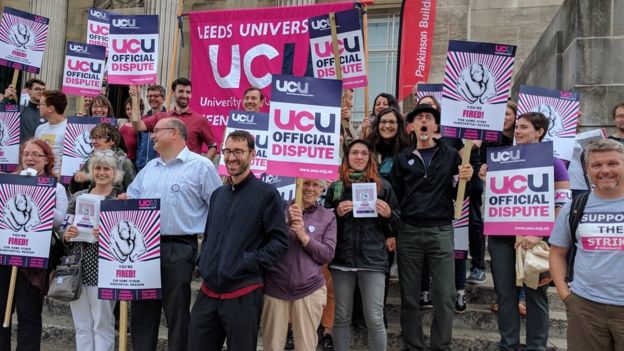From the 11 to the 13 of October, various lecturers went on strike at the University of Leeds to protest the recent developments regarding the basis upon staff may be dismissed from work. To give context, the University and College Union (UCU) aimed to put pressure on the university management to remove the ‘some other substantial reason’ clause (SOSR). The introduction of SOSR into the statues allows the university to dismiss staff under regulations which are not currently allowed such as misconduct or incapability. In addition, the downgrade of medical and legal expertise means that staff have fewer protections in cases where university management seek to dismiss them. Therefore, this lack of knowledge could theoretically lead to wrongful dismissal. It also allows more power into the hands of the university than a more objective expert.
Jonathan Saha, the main link between the UCU and the School of History, cites that the ‘proposed statues would allow the university to use dismissal procedures in cases where there is ‘third party pressure’ to remove a member of staff.’
This leads on to arguably one of the biggest issues of the strike: freedom of speech. It is feared that third party pressure could undermine academic freedom since staff may feel the threat of being removed if too controversial a topic was explored. Not only could this lead to pampered teaching but fundamentally cause an academic ignorance in certain vital aspects of history, society and so forth. One tutor stresses that her reason for taking part in the strike is to safeguard the future of academic freedom. Ignoring controversial topics would be a disservice to the education provided at a research university.
members independently decide if they should take part. For the tutor aforementioned, being part of the UCU means you ‘know you have a body of people behind you at work.’
When talking further to Jonathan Saha, it became clear this issue has been in negotiation for a number of years. The UCU ran a consultative ballot of members last spring and held a number of meetings to keep members informed throughout the last academic year. However, even before this, the union had been negotiating with the university to update the statuses for a couple of years. When it became clear ‘that university management has remained implacable over SOSR and independent experts, the union held a ballot over industrial action in which members voted overwhelmingly for both strike action and action short of a strike.’ The union is organised democratically, having locally elected committee and branch officers to lead negotiations with university management. The electoral and voting process has many layers, meaning everyone has a say whether or not they personally, take action. Even if action is voted for, members independently decide if they should take part. For the tutor aforementioned, being part of the UCU means you ‘know you have a body of people behind you at work.’
From a student perspective, it is nice to know when paying £9250 a year, the three-day strike wasn’t something taken lightly. In fact, it was repeatedly stressed how no staff member enjoys taking part in strikes. Not only as they dislike to let down students but also due to the resulting loss of pay for many members. However, as Jonathan says, fundamentally negotiations can only be fully effective when taken seriously and strikes are one of the only leverages staff are able to use to disrupt university life. It is a short-term disruption to safeguard the long-term. However, a common complaint from students was losing a 1/3 of contact hours that week, especially in subjects were contact hours are few and far between. It could be suggested that it was the university’s responsibility to set up additional catch up sessions or simply explain the state and severity of the strike and the negotiations that went on prior.
The strike is expected to receive results even if it is a ‘carefully worded letter from the Vice Chancellor’. Jonathan is confident that from the support the strike has received within the university and among local MP’s, it is incumbent upon the university management to return to negotiations.
Tara Lee

